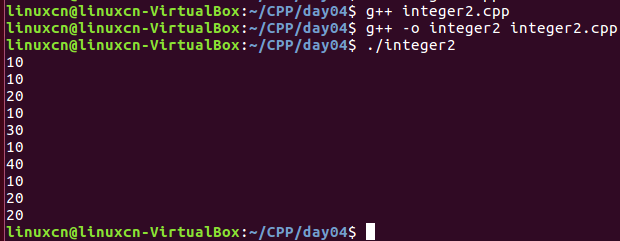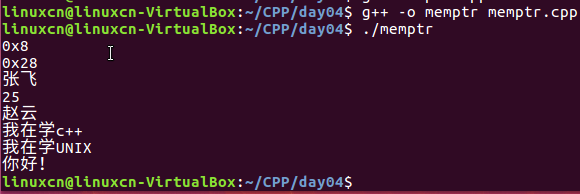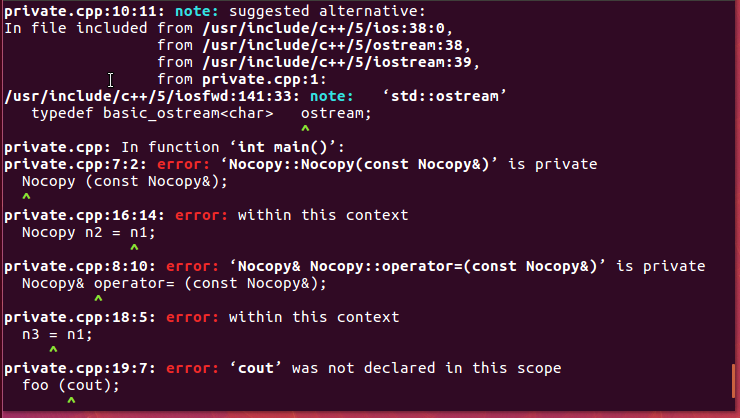5.4-day04-C++拷貝建構函式/靜態成員
阿新 • • 發佈:2018-11-29
一、拷貝建構函式和拷貝賦值運算子
1.拷貝構造:用一個已有的物件,構造和它同類型的副本物件——克隆。
2.形如
class X {
X (const X& that) { ... }
};
的建構函式成為拷貝建構函式。如果一個類沒有定義拷貝建構函式,系統會提供一個預設拷貝建構函式。預設拷貝建構函式對於基本型別的成員變數,按位元組複製,對於類型別的成員變數,呼叫相應型別的拷貝建構函式。
3.在某些情況就下,預設拷貝建構函式只能實現淺拷貝,如果需要獲得深拷貝的複製效果,就需要自己定義拷貝建構函式。
4.形如
class X {
X& operator= (const X& that) {
...
}
};
的成員函式稱為拷貝賦值運算子函式。如果一個類沒有定義拷貝賦值運算子函式,系統會提供一個預設拷貝賦值運算子函式。預設拷貝賦值運算子函式對於基本型別的成員變數,按位元組複製,對於類型別的成員變數,呼叫相應型別的拷貝賦值運算子函式。
5.在某些情況就下,預設拷貝賦值運算子函式只能實現淺拷貝,如果需要獲得深拷貝的複製效果,就需要自己定義拷貝賦值運算子函式。
練習:實現一個簡化版的字串類String支援:
1.用字元指標形式的字串構造
2.拷貝構造和拷貝賦值
3.獲取字元指標形式字串的成員函式,類似string::c_str
說明:不得使用std::string!
二、靜態成員
1.靜態成員變數和靜態成員函式是屬於類的而非屬於物件。
2.靜態成員變數,為多個物件所共享,只有一份例項,可以通過物件訪問也可以通過類訪問,必須在類的外部定義並初始化。靜態成員變數本質上與全域性變數並沒有區別,只是多了類作用域的約束,和訪控屬性的限制。
class Account {
private:
string m_name;
double m_balance;
static double m_rate;
};
3.靜態成員函式,沒有this指標,無法訪問非靜態成員。
4.單例模式
三、成員指標
Student s;
string* p = &s.m_name; // 不是
Student s2;
(一)成員變數指標
1.定義
成員變數型別 類名::*指標變數名;
string Student::*pname;
int Student::*page;
2.初始化/賦值
指標變數名 = &類名::成員變數名
pname = &Student::m_name;
page = &Student::m_age;
3.解引用
物件.*指標變數名
物件指標->*指標變數名
Student s, *p = &s;
s.*pname = "張飛";
cout << p->*page << endl;
(二)成員函式指標
1.定義
成員函式返回型別 (類名::*指標變數名) (引數表)
void (Student::*plearn) (const string&) const;
2.初始化/賦值
指標變數名 = &類名::成員函式名;
plearn = &Stduent::learn;
3.解引用
(物件.*指標變數名) (實參表);
(物件指標->*指標變數名) (實參表);
(s.*plearn) ("C++");
(p->*plearn) ("UNIX");
第三課 操作符過載
複數:3+4i
Complex
c1 - (c2 + c3)
c1.sub (c2.add (c3))
一、操作符標記和操作符函式
1.雙目操作符:L#R
成員函式形式:L.operator# (R)
左調右參
全域性函式形式:::operator# (L, R)
左一右二
2.單目操作符:#O/O#
成員函式形式:O.operator# ()
全域性函式形式:::operator# (O)
3.三目操作符:不考慮
二、雙目操作符
1.+/-/*//
運算元在計算前後不變。
表示式的值是右值。
complex.cpp
hungry.cpp
integer.cpp
integer2.cpp
lazy.cpp
memptr.cpp
private.cpp
static.cpp
string.cpp
 拷貝構造:
如果一個類沒有定義拷貝建構函式,系統會提供一個預設拷貝建構函式。預設拷貝建構函式對於基本型別的成員變數,按位元組複製,對於類型別的成員變數,呼叫相應型別的拷貝建構函式。
拷貝構造:
如果一個類沒有定義拷貝建構函式,系統會提供一個預設拷貝建構函式。預設拷貝建構函式對於基本型別的成員變數,按位元組複製,對於類型別的成員變數,呼叫相應型別的拷貝建構函式。
來自為知筆記(Wiz)
complex.cpp
#include <iostream>using namespace std;class Complex {public:Complex (int r = 0, int i = 0) :m_r (r), m_i (i) {}void print (void) const {cout << m_r << '+' << m_i << 'i' << endl;}// 第一個const:返回右值// 第二個const:支援常量型右運算元// 第三個const:支援常量型左運算元const Complex operator+ (const Complex& r) const {return Complex (m_r + r.m_r, m_i + r.m_i);}private:0int m_r;int m_i;friend const Complex operator- (const Complex&,const Complex&);};const Complex operator- (const Complex& l,const Complex& r) {return Complex (l.m_r - r.m_r, l.m_i - r.m_i);}int main (void) {const Complex c1 (1, 2);c1.print ();const Complex c2 (3, 4);Complex c3 = c1 + c2; // c3 = c1.operator+ (c2)c3.print(); // 4+6i// (c1 + c2) = c3;c3 = c2 - c1; // c3 = ::operator- (c2, c1)c3.print (); // 2+2ireturn 0;}
hungry.cpp
#include <iostream>using namespace std;// 餓漢方式class Singleton {public:static Singleton& getInst (void) {return s_inst;}private:Singleton (void) {}Singleton (const Singleton&);static Singleton s_inst;};Singleton Singleton::s_inst;int main (void) {Singleton& s1 = Singleton::getInst ();Singleton& s2 = Singleton::getInst ();Singleton& s3 = Singleton::getInst ();cout << &s1 << ' ' << &s2 << ' ' << &s3 << endl;return 0;}

integer.cpp
#include <iostream>using namespace std;class Integer {public:Integer (int data = 0) : m_data (data) {}void print (void) const {cout << m_data << endl;}/*Integer (const Integer& that) :m_data (that.m_data) {cout << "拷貝構造" << endl;}*/private:int m_data;};void foo (Integer i) {i.print ();}Integer bar (void) {Integer i;return i;}int main (void) {Integer i1 (10);i1.print ();Integer i2 (i1); // 拷貝構造i2.print ();Integer i3 = i1; // 拷貝構造i3.print ();// Integer i4 (10, 20);cout << "呼叫foo()函式" << endl;foo (i1);cout << "呼叫bar()函式" << endl;Integer i4 (bar ());return 0;}

integer2.cpp
#include <iostream>using namespace std;class Integer {public:Integer (int data) : m_data (new int (data)) {}~Integer (void) {if (m_data) {delete m_data;m_data = NULL;}}void print (void) const {cout << *m_data << endl;}Integer (const Integer& that) :m_data (new int (*that.m_data)) {}void set (int data) {*m_data = data;}Integer& operator= (const Integer& that) {// 防止自賦值if (&that != this) {// 釋放舊資源delete m_data;// 分配新資源m_data = new int (*that.m_data);// 拷貝新資料}// 返回自引用return *this;}private:int* m_data;};int main (void) {Integer i1 (10);i1.print ();Integer i2 (i1);i2.print ();i2.set (20);i2.print ();i1.print ();Integer i3 (30);i3.print (); // 30i3 = i1; // 拷貝賦值// i3.operator= (i1);i3.print (); // 10i3.set (40);i3.print (); // 40i1.print (); // 10/*int a = 10, b = 20, c = 30;(a = b) = c;cout << a << endl;*/(i3 = i1) = i2;// i3.operator=(i1).operator=(i2);i3.print ();i3 = i3;i3.print ();return 0;}

lazy.cpp
#include <iostream>using namespace std;// 懶漢方式class Singleton {public:static Singleton& getInst (void) {if (! m_inst)m_inst = new Singleton;++m_cn;return *m_inst;}void releaseInst (void) {if (m_cn && --m_cn == 0)delete this;}private:Singleton (void) {cout << "構造:" << this << endl;}Singleton (const Singleton&);~Singleton (void) {cout << "析構:" << this << endl;m_inst = NULL;}static Singleton* m_inst;static unsigned int m_cn;};Singleton* Singleton::m_inst = NULL;unsigned int Singleton::m_cn = 0;int main (void) {Singleton& s1 = Singleton::getInst ();Singleton& s2 = Singleton::getInst ();Singleton& s3 = Singleton::getInst ();cout << &s1 << ' ' << &s2 << ' ' << &s3 << endl;s3.releaseInst ();s2.releaseInst ();s1.releaseInst ();return 0;}

memptr.cpp
#include <iostream>#include <cstring>using namespace std;class Student {public:Student (const string& name, int age) :m_name (name), m_age (age) {}double m_weight;string m_name;int m_age;void learn (const string& lesson) const {cout << "我在學" << lesson << endl;}static void hello (void) {cout << "你好!" << endl;}};int main (void) {string Student::*pname = &Student::m_name;void* pv;memcpy (&pv, &pname, 4);cout << pv << endl;int Student::*page = &Student::m_age;memcpy (&pv, &page, 4);cout << pv << endl;Student s ("張飛", 25), *p = &s;cout << s.*pname << endl;cout << p->*page << endl;Student s2 ("趙雲", 22);cout << s2.*pname << endl;void (Student::*plearn) (const string&) const =&Student::learn;(s.*plearn) ("C++");(p->*plearn) ("UNIX");void (*phello) (void) = Student::hello;phello ();return 0;}

private.cpp
#include <iostream>using namespace std;class Nocopy {public:Nocopy (void) {}private:Nocopy (const Nocopy&);Nocopy& operator= (const Nocopy&);};void foo (ostream os) {os << "Hello, World !" << endl;}int main (void) {Nocopy n1;Nocopy n2 = n1;Nocopy n3;n3 = n1;foo (cout);- return 0;
}

static.cpp
#include <iostream>using namespace std;class A {public:static int m_i;static void foo (void) {cout << "foo:" << m_i << endl;// m_d = 3.14;// bar ();}cddouble m_d;void bar (void) {m_i = 1000;foo ();}};int A::m_i = 1;int main (void) {A::m_i = 10;A a1, a2;cout << ++a1.m_i << endl;cout << a2.m_i << endl;A::foo ();a1.foo ();a1.bar ();return 0;}

string.cpp
#include <iostream>#include <cstring>::using namespace std;class String {public:String (const char* str = NULL) {m_str = new char[strlen(str?str:"")+1];strcpy (m_str, str ? str : "");}~String (void) {if (m_str) {delete[] m_str;m_str = NULL;}}String (const String& that) :m_str (strcpy (new char[strlen(that.m_str)+1],that.m_str)) {}/* 菜鳥void operator= (const String& that) {m_str = new char[strlen(that.m_str)+1];strcpy (m_str, that.m_str);}*/String& operator= (const String& that) {if (&that != this) {/* 小鳥delete[] m_str;m_str = new char[strlen(that.m_str)+1];strcpy (m_str, that.m_str);*//* 大鳥char* str =new char[strlen(that.m_str)+1];delete[] m_str;m_str = strcpy (str, that.m_str);*/// 老鳥String temp (that);swap (m_str, temp.m_str);}return *this;}const char* c_str (void) const {return m_str;}private:char* m_str;};int main (void) {String s1 ("Hello, World !");cout << s1.c_str () << endl;String s2 = s1;cout << s2.c_str () << endl;String s3 ("Hello, Linux !");try {s1 = s3;}catch (exception& ex) {cout << ex.what () << endl;}cout << s1.c_str () << endl;return 0;}

 拷貝構造:
如果一個類沒有定義拷貝建構函式,系統會提供一個預設拷貝建構函式。預設拷貝建構函式對於基本型別的成員變數,按位元組複製,對於類型別的成員變數,呼叫相應型別的拷貝建構函式。
拷貝構造:
如果一個類沒有定義拷貝建構函式,系統會提供一個預設拷貝建構函式。預設拷貝建構函式對於基本型別的成員變數,按位元組複製,對於類型別的成員變數,呼叫相應型別的拷貝建構函式。
來自為知筆記(Wiz)
